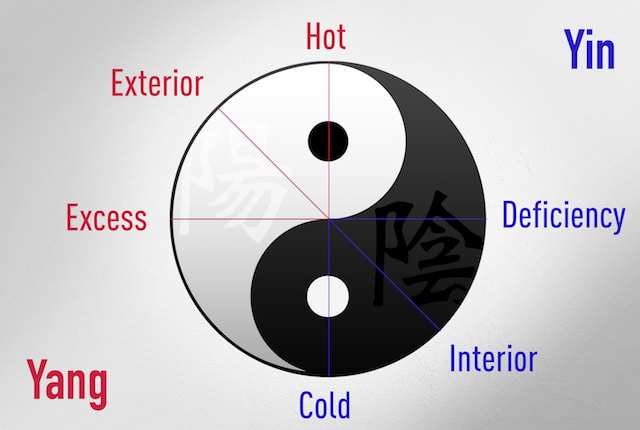Understanding Yin And Yang In Chinese Medicine: Balancing Opposing Forces For Health

Yin and Yang are fundamental concepts in Chinese philosophy and medicine that represent opposing yet interconnected forces. In Chinese medicine, the concept of balance is essential for achieving optimal health. Understanding Yin and Yang energies is crucial in this regard.
Yin energy is associated with qualities such as darkness, coldness, and stillness, while Yang energy embodies qualities like light, warmth, and movement. These two energies are not independent of each other but rather exist in a dynamic relationship, constantly influencing and transforming one another.
In the human body, the interactions between Yin and Yang energies play a vital role in maintaining health. When Yin and Yang are in balance, the body functions harmoniously, promoting overall well-being. However, imbalances between these forces can lead to various health issues.
Traditional Chinese medicine treatments aim to restore the equilibrium between Yin and Yang energies. This can be achieved through a combination of acupuncture, herbal remedies, and lifestyle adjustments.
By understanding the principles of Yin and Yang and applying them in our daily lives, we can strive for a state of equilibrium and achieve optimal health and well-being.
The Origins of Yin and Yang in Chinese Philosophy
The concept of Yin and Yang in Chinese philosophy traces its origins to ancient texts such as the Book of Changes and the Dao De Jing. These texts, dating back to the 6th century BCE, provided a framework for understanding the natural world and human existence.
Yin and Yang are opposing forces that are believed to be present in all aspects of life. Yin represents darkness, femininity, and passivity, while Yang represents light, masculinity, and activity. According to Chinese philosophy, these two forces are interconnected and interdependent, and their balance is essential for maintaining harmony and good health.
The concept of Yin and Yang has had a profound influence on various aspects of Chinese culture, including medicine. In Chinese medicine, the goal is to achieve a balance between Yin and Yang, as an imbalance is believed to lead to illness.
The Concept of Balance in Chinese Medicine
The concept of balance plays a crucial role in Chinese medicine, as it is believed that maintaining a harmonious equilibrium within the body is essential for good health.
When there is an imbalance between the opposing forces of yin and yang, it can lead to the development of diseases.
This understanding highlights the importance of restoring balance through various therapeutic approaches in Chinese medicine to promote wellness and prevent illness.
The importance of balance in the body
Balance is crucial for maintaining optimal health and well-being, as it allows the intricate interplay of opposing forces within the body to harmonize and create a state of equilibrium. This delicate balance is essential for the proper functioning of various bodily systems and processes.
Here are three reasons why balance is important in the body:
- Homeostasis: Balance helps to maintain a stable internal environment, known as homeostasis. This ensures that bodily functions operate within a narrow range, allowing cells, tissues, and organs to function optimally.
- Energy flow: Balance ensures a smooth flow of energy throughout the body. In Chinese medicine, this energy is known as Qi, and when it is balanced, it promotes overall health and vitality.
- Disease prevention: Imbalances in the body can lead to the development of diseases or disorders. By maintaining a state of balance, the body is better equipped to prevent the onset of various health issues and promote overall well-being.
Balance plays a crucial role in maintaining optimal health and well-being by allowing the harmonious interplay of opposing forces within the body.
How imbalance leads to disease
Imbalances in the body disrupt the intricate interplay of various physiological processes, leading to the manifestation of diseases and disorders.
In Chinese medicine, the concept of yin and yang is used to understand and address these imbalances. When yin and yang are in harmony, the body is in a state of equilibrium and health. However, when there is an excess or deficiency of either yin or yang, an imbalance occurs, which can lead to disease.
For example, an excess of yang energy may result in symptoms such as fever, restlessness, and rapid heartbeat, while an excess of yin energy may lead to coldness, lethargy, and fluid retention.
By identifying and correcting these imbalances, Chinese medicine aims to restore harmony and promote overall well-being.
Understanding Yin Energy
Yin energy is a fundamental concept in Chinese medicine, representing the feminine, cool, and dark aspects of nature.
In the body, yin energy is associated with organs and tissues that store and nourish, such as the kidneys, liver, and blood.
Its functions include providing moisture, lubrication, and cooling properties, as well as supporting the body’s ability to rest, regenerate, and maintain balance.
Characteristics of yin energy
Contrasting the active and energetic qualities associated with yang energy, yin energy in Chinese medicine is characterized by its passive and receptive nature. Yin energy is often associated with the feminine, dark, and cold aspects of life. It represents stillness, rest, and nourishment. Yin energy is symbolized by water, earth, and the moon.
In the body, yin energy is responsible for the nourishment of organs and tissues, promoting their growth and regeneration. It is also associated with the cooling and calming functions of the body. Yin energy is essential for maintaining balance and harmony in the body. When yin energy is deficient, symptoms such as dryness, heat, and restlessness may arise.
Therefore, it is important to cultivate and balance the yin energy in order to achieve optimal health and well-being.
Yin energy in the body and its functions
The passive and receptive nature of yin energy in the body allows for the nourishment, growth, and regeneration of organs and tissues, promoting balance and harmony. Yin energy plays a crucial role in maintaining homeostasis and supporting the overall functioning of the body. It is responsible for preserving and storing energy, fluids, and nutrients, ensuring their availability when needed. Yin energy governs the cooling and moisturizing functions of the body, helping to regulate body temperature and keeping the tissues hydrated. It also facilitates the smooth flow of bodily fluids, such as blood and lymph, ensuring adequate circulation and nourishment to all parts of the body. Overall, yin energy maintains the body’s structural integrity, supports its vital functions, and provides a foundation for optimal health.
| Functions of Yin Energy |
|---|
| Nourishment |
| Growth |
| Regeneration |
Exploring Yang Energy
This paragraph discusses the characteristics of yang energy, its presence in the body, and its functions.
Yang energy is characterized by qualities such as warmth, activity, and expansion, and it is considered to be the active and masculine force in Chinese medicine.
In the body, yang energy is responsible for processes such as digestion, metabolism, and circulation, as well as providing the necessary energy for physical and mental activities.
Understanding the characteristics and functions of yang energy is important in maintaining a balanced state of health and well-being.
Characteristics of yang energy
Yang energy, in the context of Chinese medicine, is characterized by its dynamic, outward, and expansive nature. It represents the active, masculine, and warm aspects of life. Yang energy is associated with movement, heat, and stimulation. It is responsible for physical activities, such as digestion, metabolism, and circulation. In Chinese medicine, the balance between yin and yang is crucial for maintaining optimal health. When yang energy is excessive, it can manifest as symptoms like restlessness, agitation, and hyperactivity. On the other hand, when yang energy is deficient, it can result in lethargy, coldness, and weakness. The following table illustrates the characteristics of yang energy:
| Characteristics of Yang Energy |
|---|
| Dynamic |
| Outward |
| Expansive |
| Active |
Understanding the characteristics of yang energy helps practitioners diagnose and treat imbalances in the body and restore harmony between yin and yang.
Yang energy in the body and its functions
Moving on from the characteristics of yang energy, it is important to understand its manifestations within the human body and its various functions.
Yang energy in the body is associated with warmth, activity, and expansion. It is responsible for metabolism, providing energy for physical and mental activities, and maintaining body temperature.
In Chinese medicine, yang energy is believed to circulate along specific meridians or pathways, facilitating the smooth functioning of organs and promoting vitality. It is also responsible for promoting growth and development, as well as maintaining the body’s defense mechanisms against external pathogens.
By understanding the presence and functions of yang energy within the body, practitioners of Chinese medicine aim to maintain a harmonious balance between yin and yang, promoting overall health and well-being.
Yin and Yang Interactions in the Body
Interactions between the opposing forces of yin and yang in the body play a crucial role in maintaining a state of harmonious balance for optimal health. Yin and yang are not static entities but rather dynamic forces that constantly interact and influence each other within the body. These interactions create a delicate equilibrium that is essential for overall well-being.
To better understand the interplay between yin and yang, a table can be used to illustrate their characteristics and functions:
| Yin | Yang |
|---|---|
| Cold | Hot |
| Dark | Light |
| Female | Male |
| Restorative | Active |
| Internal | External |
| Contracting | Expanding |
This table highlights the opposing nature of yin and yang and how their interactions contribute to the body’s balance. The body’s ability to maintain a harmonious interplay between these forces is crucial for optimal health and vitality.
Balancing Yin and Yang for Optimal Health
The previous subtopic explored the interactions between yin and yang in the body, highlighting their complementary and interdependent nature.
Building upon this understanding, the current subtopic delves into the significance of balancing yin and yang for optimal health.
In Chinese medicine, achieving harmony between these opposing forces is crucial for maintaining physical, mental, and emotional well-being.
Imbalances in yin and yang can lead to various health issues, such as fatigue, insomnia, or digestive disorders.
Therefore, practitioners of Chinese medicine focus on identifying and addressing these imbalances through various techniques, including acupuncture, herbal medicine, and dietary adjustments.
By restoring equilibrium between yin and yang, individuals can enhance their overall health and vitality, allowing their bodies to function optimally and promoting a state of holistic well-being.
Yin and Yang in Traditional Chinese Medicine Treatments
This discussion will explore the role of acupuncture in maintaining yin-yang balance in Traditional Chinese Medicine treatments.
Acupuncture is believed to restore balance by stimulating specific points on the body to regulate the flow of qi and restore harmony between yin and yang.
Additionally, herbal medicine is used to restore harmony by addressing imbalances in yin and yang through the use of specific herbs and formulas tailored to an individual’s unique constitution.
Acupuncture and yin-yang balance
Acupuncture is a traditional Chinese medicine practice that plays a crucial role in restoring the delicate balance between yin and yang energies in the body. According to the principles of yin and yang, health is achieved when these opposing forces are in harmony.
Acupuncture aims to correct any imbalances by stimulating specific points on the body using thin needles. The selection of acupuncture points is based on the concept of meridians, which are believed to be pathways through which qi, or vital energy, flows. By inserting needles into these points, acupuncturists aim to regulate the flow of qi and restore balance between yin and yang.
This can help alleviate various health conditions and promote overall well-being. Acupuncture is often used in conjunction with other traditional Chinese medicine treatments to achieve optimal yin-yang balance and enhance the body’s natural healing abilities.
Herbal medicine and restoring harmony
Herbal medicine is an ancient practice that aims to restore harmony within the body, promoting emotional and physical well-being. In Chinese medicine, the concept of yin and yang is integral to understanding the balance and harmony of the body.
Yin represents the cooler, slower, and more passive aspects, while yang represents the warmer, faster, and more active aspects. When there is an imbalance between these opposing forces, it can lead to illness and disease.
Herbal medicine is used to restore this balance by using specific herbs that have yin or yang properties. For instance, herbs with cooling properties may be used to counteract excessive yang energy. Similarly, herbs with warming properties may be used to counteract excessive yin energy.
By restoring the balance between yin and yang, herbal medicine can help promote overall health and well-being.
Applying Yin and Yang Principles in Daily Life
Applying the principles of Yin and Yang in daily life allows for the harmonious balance of opposing forces, promoting overall health and well-being. This concept, rooted in Chinese medicine, emphasizes the need to maintain equilibrium between Yin and Yang energies.
To achieve this balance, individuals can incorporate the following practices into their daily routines:
- Regular exercise: Engaging in physical activity helps to cultivate both Yin and Yang energies, promoting circulation and vitality.
- Mindfulness and meditation: These practices enable individuals to cultivate inner awareness and foster a sense of calm, balancing the Yin and Yang aspects of the mind.
- Balanced diet: Consuming a variety of foods that incorporate both Yin (cooling) and Yang (warming) properties ensures the nourishment of the body.
- Adequate rest: Allowing for sufficient rest and sleep supports the restoration of Yin and Yang energies, promoting overall well-being.
- Harmonious relationships: Cultivating positive and balanced relationships with others fosters harmony and contributes to the balance of Yin and Yang energies within oneself.
By incorporating these practices into daily life, individuals can maintain the delicate equilibrium of Yin and Yang energies, promoting health and well-being.
Frequently Asked Questions
How can I incorporate yin and yang principles into my daily exercise routine?
To incorporate yin and yang principles into a daily exercise routine, one can focus on balancing opposing forces. This can be achieved by incorporating both yin exercises, such as yoga or tai chi, and yang exercises, such as running or weightlifting, in a well-rounded program.
Are there any specific foods or dietary guidelines that promote yin and yang balance?
Specific foods and dietary guidelines can promote yin and yang balance in Chinese medicine. This balance can be achieved by consuming cooling, yin-promoting foods such as fruits and vegetables, and warming, yang-promoting foods like meats and spices.
Can yin and yang imbalances affect mental health and emotional well-being?
Yes, imbalances in yin and yang can affect mental health and emotional well-being. In Chinese medicine, excessive yin can lead to depression and lack of motivation, while excessive yang can cause anxiety and irritability.
Is there any scientific evidence to support the concept of yin and yang in Chinese medicine?
Scientific evidence to support the concept of yin and yang in Chinese medicine is limited. While some studies have explored aspects of yin and yang, further research is needed to fully understand and validate its principles in a scientific context.
Are there any specific herbs or herbal remedies that are commonly used to restore yin and yang balance in the body?
There are specific herbs commonly used in Chinese medicine to restore yin and yang balance in the body. These include dong quai, rehmannia, astragalus, and licorice root, among others. They are believed to nourish and harmonize the body’s opposing forces.









